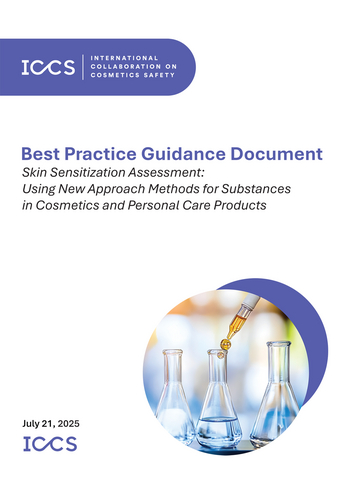ICCS Debuts Best Practice Guidance Series Focus on Skin Sensitization Without Animal Testing
ICCS Debuts Best Practice Guidance Series Focus on Skin Sensitization Without Animal Testing
NEW YORK--(BUSINESS WIRE)--The International Collaboration on Cosmetics Safety (ICCS) announces its first-ever Best Practice Guidance (BPG): “Skin Sensitization Assessment: Using New Approach Methods for Substances in Cosmetics and Personal Care Products.” This document marks the inaugural publication in a new series of ICCS Best Practice Guidance documents, developed to support the global transition to animal-free safety science.
“This guidance reflects the collective expertise of ICCS members who came together to align on the development of this unique guidance,” said Erin Hill, President & CEO of ICCS.
Share
ICCS was invited to present the BPG at the Integrated Strategies for Safety Assessment of Cosmetics Joint Regulators-Industry Workshop hosted by the International Cooperation on Cosmetics Regulation (ICCR) on July 11, where regulators from more than 12 countries convened to advance non-animal methodologies.
“This guidance reflects the collective expertise of ICCS members who came together to align on the development of this unique guidance,” said Erin Hill, President & CEO of ICCS. “It’s a key example of our mission to build global capacity and accelerate the uptake of animal-free safety assessments. We greatly appreciate the opportunity to collaborate with the ICCR to hear their input on the workflow in the document.”
Grounded in Next Generation Risk Assessment (NGRA) principles, the BPG offers a structured, science-based workflow that includes practical steps from problem formulation, exposure assessment, data evaluation, to transparent decision-making. It is especially suited for safety assessors experienced in traditional methods but new to using NAMs.
What Makes the ICCS BPG Unique
This BPG builds on existing international frameworks—such as OECD test guidelines and ICCR principles—by integrating them into a cohesive, assessor-friendly workflow. It emphasizes practical use and real-world safety scenarios and is specifically designed for regulatory safety assessments of cosmetics and personal care products. Notably, the guidance provides tools for transparent decision-making, uncertainty characterization, and exposure-based waiving, offering assessors clear and pragmatic support for transitioning to animal-free science.
Key Highlights of the BPG:
- Step-by-step workflow to guide assessors through skin sensitization hazard and safety assessments without new animal tests.
- Integration of in silico, in chemico, and in vitro methods, including those aligned with OECD Test Guidelines.
- Designed for regulatory use, especially for assessors transitioning from animal to non-animal approaches.
The full guidance is now freely available for download on the ICCS Website
Looking Ahead
The Skin Sensitization BPG is the first in a planned suite of ICCS Best Practice Guidance documents. Forthcoming documents planned are: eye and skin irritation, read-across, thresholds of toxicological concern (TTC), physiologically based kinetic (PBK) modeling, exposure-based waiving, and environmental safety endpoints.
These guidance documents will continue to support ICCS’ goal of equipping the international community with practical tools for modern, human-relevant, and animal-free safety assessments.
About ICCS
The International Collaboration on Cosmetics Safety is a global initiative headquartered in New York. It brings together scientists from industry, academia, and non-governmental organizations to promote the adoption and regulatory acceptance of animal-free safety science through education, research, and collaboration.
Contacts
Kelly Semrau – ksemrau@iccs-cosmetics.org

